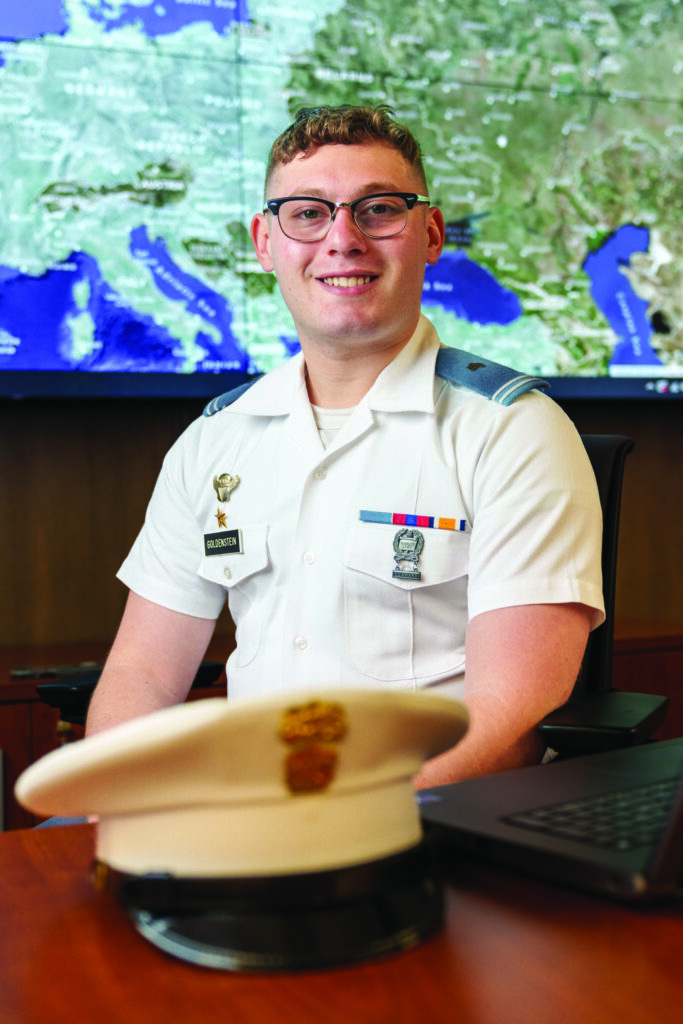Samuel Goldenstein, ’24, has always searched for opportunities to serve. As the son of a stockbroker growing up in post-9/11 New York City, the intelligence and security studies major felt his calling in national defense. “My parents were afraid to let me take the subway every year on September 11 because they were scared of these attacks,” said Goldenstein. “I asked myself, ‘How can I fix this?’”
His interest in foreign policy and military intelligence led him to The Citadel. “The political science department is outstanding. The Citadel was effectively a no-brainer for me, even though it was so far from home,” said Goldenstein. “I think the opportunity to serve is the biggest opportunity that one can be given, and The Citadel allowed me to learn to be an asset to national security.”
“The Citadel allowed me to learn to be an asset to national security.”
As a cadet, Goldenstein’s interest in intelligence and security led him all over the world, beginning with a study abroad to Tallinn, Estonia, after his freshman year, where he studied Russian hybrid warfare and NATO/Baltic military and cyber operations. “I fell in love with the Baltics and their culture,” said Goldenstein. “I realized that the Baltic-Nordic region is the area of responsibility that I am most interested in.”
The following summer, he returned to Tallinn as a research analyst intern at the International Center for Defense and Security, where he researched and developed intelligence reports to assess the effectiveness of American and Western military aid to Ukraine. “I got used to being the only American in the room,” said Goldenstein. “I’m also usually the youngest one in these programs, so it requires a lot of proving yourself right off the bat. The Citadel is all about proving yourself, so it’s something I’m used to.
Goldenstein was more than up to the challenge. At the end of his two-month internship in Estonia, he flew to Cambridge University to participate in the International Security and Intelligence Programme hosted by the Cambridge Security Initiative and the Department of War Studies at King’s College London.

While there, Goldenstein conducted research on security issues through the lens of Anglo-American intelligence agencies. Moreover, Goldenstein had the opportunity to meet and work with leaders and practitioners in intelligence and security communities all over the world. “The opportunity to be overseas really plays hand-in-hand with my intelligence degree,” said Goldenstein. “Experience is the biggest thing. If you’re on a team that does analysis overseas or has a strategic concentration overseas, you need to have the background for it.”
Goldenstein made sure he did. In the spring of 2024, he returned to Estonia once more for a course entitled Cyber Defense Policy on National and International Levels at the Baltic Defence College in Tartu, where more than 18 nations were represented by professionals in the defense and security sector. “I got to brief an audience of 18 NATO and EU nations on a highly complex cyber policy,” said Goldenstein. “Rarely, especially at the undergraduate level, do you have the opportunity to go and work with so many different nations on such complex topics.”
Cyber policy wasn’t the only thing he had to step up for while overseas. After losing his class ring in a snowball fight, Goldenstein had to recruit the help of his colleagues—military intelligence and security professionals representing 10 nations who were also involved in the icy skirmish. “I’ve been telling my friends I led a multinational coalition on an operation to find my graduation ring,” said Goldenstein. And while their search was unsuccessful, Goldenstein remembers the effort fondly. Ultimately, his ring was returned months later by a good Samaritan.
Although far from The Citadel campus he called home, servant leadership remained at the heart of his Baltic experience. “The opportunity to work hand in hand with our Estonian, Latvian or Lithuanian counterparts in a real-world environment is an experience that you can’t be given within the United States,” said Goldenstein. “The biggest thing is to listen. You have to sit down with your allied nation and say, ‘Hello, we’re here to help. Let’s serve, let’s go.’”
In May, Goldenstein was awarded the Leidos Courage Award from the School of Humanities and Social Sciences for embodying the values of a principled leader within his field of study. The three-year graduate will soon be serving as an intelligence specialist with the Department of Defense in Virginia.
